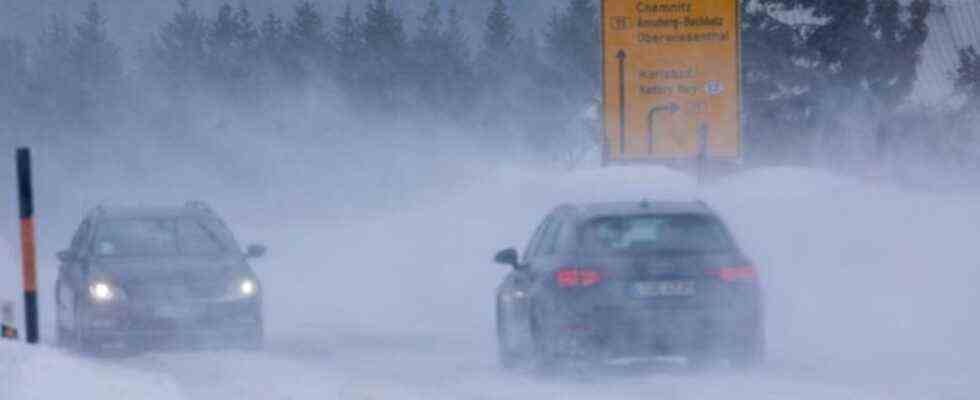weather
Deep “Antonia”: Another storm night in Germany
At up to 116 kilometers per hour, the storm “Zeynep” swept across Saxony at the weekend, causing numerous trees to fall. Photo: Bernd March/dpa
© dpa-infocom GmbH
First “Ylenia”, then “Zeynep”, now “Antonia”: The series of severe storms in Germany is not yet over. Train commuters have to reckon with a difficult start to the week in many places.
Another restless night has been announced for many people in Germany:
With storm “Antonia” there was again a risk of severe storms up to hurricane gusts and individual thunderstorms, after the hurricanes “Ylenia” and “Zeynep” had already caused rows of trees to fall and damaged buildings in the past few days. In addition, heavy rain can be expected in some areas by Monday, the German Weather Service (DWD) reported. The Federal Maritime and Hydrographic Agency warned that there was a risk of storm surges again for the German North Sea coast. Train travelers have to be prepared for impairments at the start of the week due to considerable damage.
“We still have to get through the storm situation until Monday,” said a DWD meteorologist in Offenbach. The weather only calmed down in the evening. “The wind will remain an issue for the week,” he explained. “However, it will be a completely different house number than what we are experiencing these days.”
For many regions from the Baltic Sea coast to the edge of the Alps, the DWD warning map was colored red on Sunday evening – there were severe weather warnings of hurricane gusts. Trees could be uprooted, roof tiles or other objects could fall. “Close all windows and doors! Secure outdoor objects!”, It was said by the DWD for the regions concerned. “Try to avoid staying outside!”
Deutsche Bahn (DB) asked its passengers to find out whether the planned journey was possible. This applies in particular to commuters in rush-hour traffic. Those who can should postpone the trip. According to Deutsche Bahn, a total of more than 6,000 kilometers of the route network were temporarily unusable after the stormy days that had passed. Around 2,000 emergency services are on the move around the clock to remove fallen trees and repair overhead lines. “We can currently drive about three quarters of long-distance traffic,” said railway spokesman Achim Stauss late on Sunday afternoon.
DB stops rail traffic in NRW
In North Rhine-Westphalia, DB stopped regional traffic on Sunday evening due to the storm “Antonia”. “We will no longer send any new trains onto the route after 8 p.m.,” said a spokeswoman. This is a precautionary measure. Regional trains are expected to resume operations on Monday morning. The railway company Metronom, which operates many regional lines in Lower Saxony, Hamburg and Bremen, also wanted to gradually discontinue its train services on Sunday. An emergency bus service is expected to last until Monday afternoon.
Due to the expected storm in parts of Bavaria and restrictions on train traffic, some of the lessons in the Lower Franconian district of Miltenberg are to be canceled this Monday. The background to this is that the West Franconia Railway will stop train services on the entire route network from Sunday evening to Monday morning, according to the Bavarian Ministry of Education.
Schleswig-Holstein’s Transport Minister Bernd Buchholz (FDP) demanded better storm crisis management from Deutsche Bahn. He called for a more thorough and earlier green cut to prevent trees falling on overhead lines along the electrified routes. He will address this again to DB board member Ronald Pofalla, he announced on Sunday evening.
Shipping also affected
Disabilities do not only exist on the rails, but also, for example, for ship passengers on the Baltic Sea between Rostock and Denmark. As the ferry company Scandlines announced, the trips between Rostock and the Danish port of Gedser were canceled until Monday noon.
In the past few days, at least six people have died in accidents in Germany because of “Ylenia” and most recently “Zeynep”. There were also fatal accidents in several other European countries, such as Poland, the Netherlands, Great Britain and Belgium.
According to initial estimates, the two hurricane lows are likely to cost insurers more than 1.4 billion euros. “Zeynep” caused insured damage of over 900 million euros, said the management consultancy Meyerthole Siems Kohlruss (MSK), which specializes in actuarial mathematics, in Cologne. It was the most intense storm since “Kyrill” in 2007. The company estimated the insured damage from the storm “Ylenia” at 500 million euros.
The fire brigade in Berlin alone has registered 15,300 emergency calls since Thursday. The emergency services deployed to around 4,000 weather-related operations between Thursday morning and Sunday afternoon, as the capital fire brigade announced on Sunday evening. It was “the most active state of emergency weather in the history of the Berlin fire brigade”. In such a state of emergency, for example, the voluntary fire brigades are called to work and operations are prioritized.

